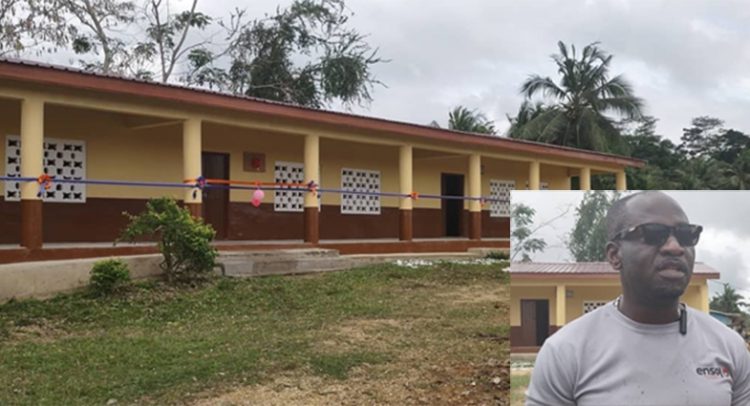The new school block. INSET: Kofi Yalley
The people of Ahuntunano, a farming community in the Ahanta West Municipality of the Western Region can now heave a sigh of relief following the commissioning of a three-unit classroom block for the MA Primary School in the area.
The school building, which used to be dilapidated, was rehabilitated and commissioned by Southey Contracting Limited, an organisation that provides services to both offshore and onshore facilities.
It was part of the company’s Corporate Social Responsibility (CSR).
Chief Executive Officer (CEO) of Southey Contracting Limited, Kofi Yalley, explained that human resource development is key to the success of a nation, hence, the company’s resolve to promote education within the district.
He stated, “Last year, we were at Butre in the Municipality to commission a bridge we constructed for the community, this year, before embarking on this CSR, we received many applications but we decided to assist the Ahuntunano MA Primary because education remains a topmost priority to us”.
He indicated that after visiting some of the classrooms, he observed that most of them do not have adequate desks for use by the pupils.
He then promised that the company would provide enough desks for the school to enhance teaching and learning.
He advised the teachers and pupils to uphold the good maintenance culture and protect the facility to ensure that it stands the test of time.
The CEO of Southey Contracting Limited later presented some books to the school.
The Ahanta West Municipal Chief Executive (MCE), John Agyare praised the company for the initiative to give the school block a face-lift.
He advised the school kids to take their studies seriously to justify the huge investments made in them by the company.
Deputy Director, in charge of Supervision and Monitoring at the Ahanta West Education Directorate, Alloysius Baodi described the intervention as timely and promised that the building would be taken care of.
The Divisional Chief of Ahuntunano, Nana Egya Butsir X advised parents to intensify the supervision of their wards and not to leave that responsibility on the teachers alone.
From Emmanuel Opoku, Ahuntunano


